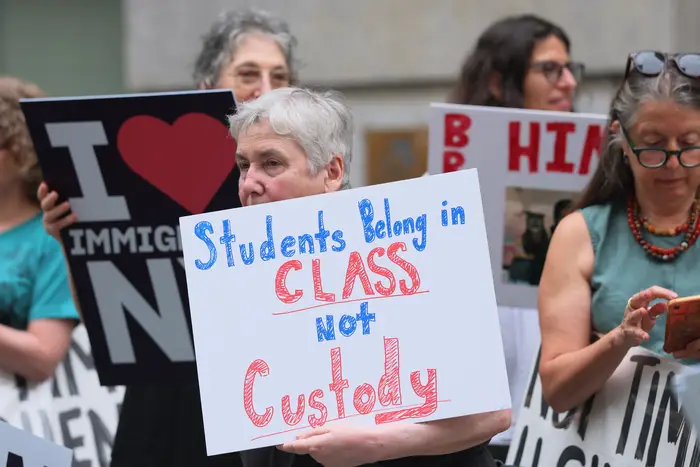As the new school year approaches, immigrant families in New York City face heightened anxiety due to ongoing concerns about U.S. Immigration and Customs Enforcement (ICE) actions. Parents and educators report that worries over potential detentions overshadow typical back-to-school preparations. This atmosphere of fear is particularly acute for families without legal immigration status.
For many, the stress extends beyond selecting backpacks and school supplies. They grapple with critical questions: Can ICE agents enter local schools? Are schools permitted to share information with ICE? What will happen to their children in the event of an unexpected detention? According to Katie Kurjakovic, an English language learner specialist at the United Federation of Teachers, “There is trepidation in immigrant communities and increased stress,” particularly following reports of students being detained after immigration court hearings.
Despite these fears, data indicate that fewer than six immigrant students in New York City public schools have been detained by ICE since President Donald Trump took office on January 20, 2017. These detentions typically occurred after court hearings and not on school premises. However, the frequency of ICE enforcement actions has increased, especially during the summer months, as the administration has intensified its focus on immigrants exiting court.
Education Department Encourages Enrollment
In light of these challenges, the city’s Department of Education is actively encouraging parents to keep their children enrolled in school. Department spokesperson Nicole Brownstein stated, “We want to reassure all families: Our schools are safe, welcoming places, and we encourage you to continue sending your children to school, where they are cared for and valued.” This statement aligns with a long-standing U.S. Supreme Court precedent affirming that every child has a right to public education, regardless of immigration status.
Under New York state law, residents between the ages of 5 and 21 have the right to attend public schools. Additionally, students are entitled to translation and interpretation services, as well as free meals if they qualify. Diana Aragundi, assistant director of the Immigrant Students’ Rights Project at Advocates for Children, emphasizes that the need for these services remains critical as families navigate their concerns.
The current administration has made it clear that schools, hospitals, and courthouses are no longer considered “sensitive locations” off-limits to immigration enforcement. Despite reports of ICE attempting to enter public schools in other states, the New York City Department of Education reports no documented incidents of ICE officers seeking entry into city public school buildings. According to the department, ICE is generally barred from entering schools without a judicial warrant or in emergency situations.
Protocols for ICE Interactions
Should ICE agents arrive at a school, the established protocol requires security personnel to alert the principal and ask the agents to wait outside. School principals must consult with legal counsel before taking further action. Melissa Aviles-Ramos, Schools Chancellor, reiterated this stance in a video statement, emphasizing that non-local law enforcement is not allowed in school buildings without appropriate legal authority.
Students should feel secure in their educational environment, according to Emma Hulse, an education attorney at the New York Civil Liberties Union (NYCLU). She notes, “There are ways that they could improve their protocol, but people should feel confident that going to school is safe.” New York state law prohibits schools from inquiring about a child’s or parent’s immigration status. Should school staff become aware of someone’s immigration status, they are required to maintain confidentiality.
Federal law generally restricts schools from releasing personal information without parental consent. ICE may only access a student’s confidential information if they possess a signed judicial warrant or subpoena. Even in instances where a subpoena is present, the school district must inform the parent, allowing them an opportunity to contest the release of data.
As a precaution, parents are encouraged to keep their children’s emergency contact information up to date. In cases where a child is not picked up from school—such as during a parent’s detention—schools will reach out to designated emergency contacts. Advocates recommend that parents designate trusted adults who can provide assistance in such scenarios. Aragundi notes, “It seems like a very minor thing, but it’s still an important piece of information that we can share with schools.”
Immigrant parents are also advised to proactively communicate with their schools before attending immigration hearings or appointments where they fear detention. The Department of Education can help connect families with legal support and resources if needed. Brownstein stated, “When we hear about a family that is being detained, we have— with their permission—connected them with community and agency partners who can offer legal support and other resources.”
Additionally, parents can assign someone to make decisions for their children or act as a temporary guardian in the event of their detainment or deportation. Without such arrangements, children may be placed in foster care if their parents are detained. Julie Babayeva, supervising attorney at the New York Legal Assistance Group’s LegalHealth Unit, stresses the importance of safety planning, urging families to consider these arrangements before emergencies arise.
Families can officially designate a trusted adult as a “person in parent relation,” allowing that individual to make educational and some medical decisions for a limited time. They may also name a “standby guardian” to assume temporary care of their children if the parent is arrested. Furthermore, parents can designate an agent under a “power of attorney” to manage financial matters.
For assistance in making these designations, Babayeva recommends consulting with an attorney or contacting her organization’s hotline at 212-659-6188. Luis Mancheno, citywide director of immigrant justice at Legal Services New York City, acknowledges the emotional toll of planning for potential family separation but encourages families to take proactive measures. “It’s better to take these steps and make sure that they are the best prepared,” he advises.
Legal Services New York City also offers clinics that support families in filing necessary documents for standby guardianship and navigating their options. Interested individuals can contact LSNYC at 917-661-4500 for more information. As the school year begins, immigrant families in New York City continue to navigate the complexities of education amid the looming threat of ICE, striving for safety and stability in their children’s schooling.






































































